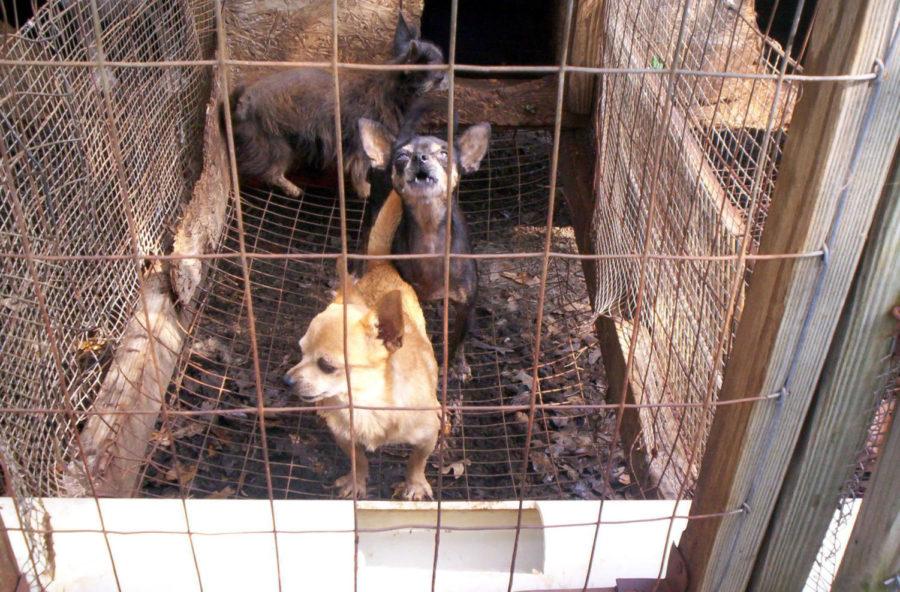Puppy mill abuse brought to light
March 1, 2016
Defending the welfare of dogs associated with Iowa puppy mills was the focus of “Puppy Mill Politics,” an educational presentation that took place in Kildee Hall on Tuesday.
Sponsored by the Students Helping Rescue Animals group at Iowa State, an organization that focuses on fundraising, volunteering and education toward animals in shelters, the speech was coordinated by members of the Iowa Friends of Companion Animals on the issue of the struggles met with fighting against large puppy mills.
The Iowa Friends of Companion Animals is an activist group stemming from Iowa that works to educate the public on problems of animal abuse and neglect, as well as lobby for better legislation to uphold animal rights.
“In a crazy way I like to liken a puppy mill to big foot,” said Lisa Keel, a volunteer member of the IFCA. “We’ve all heard of him and we know it’s out there, but people rarely see it. Puppy mills are the same way and are often hidden across our rural landscape.”
Because of the rich agriculture setting of many Midwest towns, states such as Iowa, Texas, Nebraska and Missouri are among the worst offenders of puppy mill production in the United States because of the ease of disguising undesirable living conditions.
“Iowa has the second largest amount of puppy mills in the U.S. behind Missouri with about 216 licensed breeders,” Keel said. “A lot of breeders keep dogs on farm and there aren’t a whole lot of places where there’s vast amounts of farmland besides in places like Iowa.”
Sioux, Lee, Worth and Davis County are among the largest in Iowa in terms of mills per areas for Iowa. About half of the mills contain between one and 50 adult dogs, while a rare singular case involved more than 1,200 dogs confined to a single mill.
In order to combat over-crowding and harsh conditions, Iowa has enacted several measures to keep puppy mill owners responsible for their animals.
The first requires all mill owners to carry a permit by the state of Iowa in order to sell puppies from three or more adult dogs, or a permit from the USDA to sell directly to pet stores from four or more dogs.
Semi-regular checkups also occur by inspectors appointed by the USDA. Any infractions to the health code associated with animals could result in a suspension or revoking of a miller’s license.
Despite these attempts at regulation, the IFCA does not see these measures as adequate enough to protect developing puppies.
“One of the main issues we see from documentation is that many dogs are sitting in complete darkness, which is a violation of Iowa code due to the dark messing with their circadian rhythms,” said Mary LaHay, president of the IFCA.
The group pointed out an image detailing a semi truck being used as a site for a puppy mill with inadequate light, bedding and filtration systems but was still approved by the USDA for a license.
“When you in your mind equate USDA with something good, in say your pet’s food supply, you may want to start thinking again,” Keel said.
A major repercussion seen by the IFCA from puppy mills remains the financial problems that fall upon the mill’s community.
“We know that almost 30 percent of these breeders are not paying sales taxes on their dogs on an almost $17 million industry,” Keel said. “It’s also bad for consumers because many of these puppies will get sick after being purchased and cost the family thousands of dollars in medical care.”
Puppy mills continue to exist mainly because of the lucrative nature of the business as well as family ties to many generations of millers.
“One of the pairs who we found in Iowa was a father and son duo, the son of which was a guidance counselor at the nearby high school,” LaHay said. “That year they made almost a half a million dollars off of their puppies.”
As a closing note, the group urged advocates to write lawmakers, petitioning for better representation of animal rights in legislation, as well as asking for buying advice.
“If you take one thing from us it’s that you should never buy a puppy without seeing its mother and where she lives, and always try to adopt from a shelter if possible,” Keel said. “We aren’t against breeders as a whole. We just don’t like the ones who don’t do it right.”

















